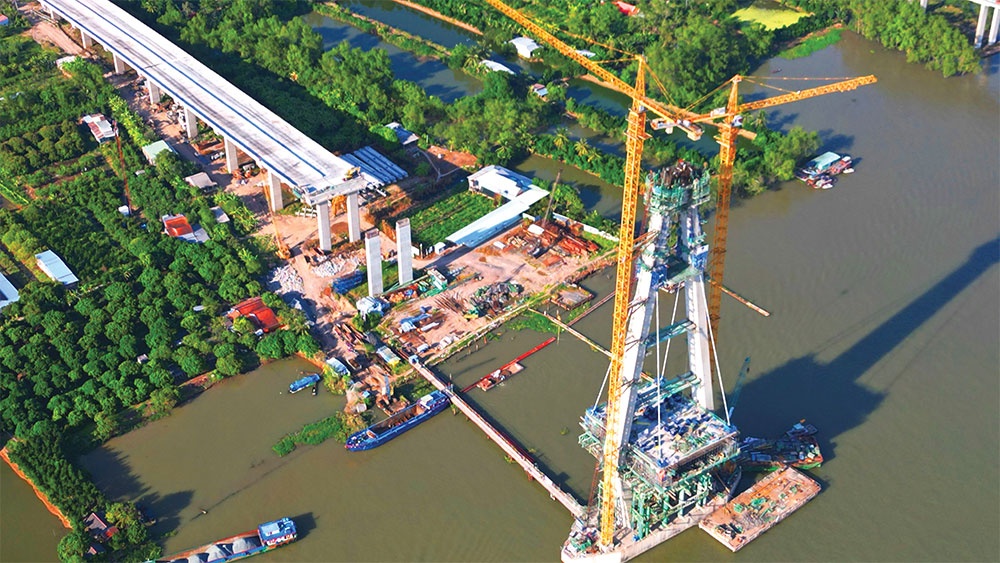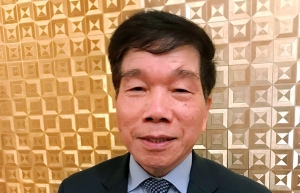Builders weigh up resolution methods
 |
| Japanese businesses in particular are paying great attention to new construction opportunities, photo Le Toan |
Many construction contractors are currently dissatisfied with the business hazards they face. According to Hoang Thieu Bao, deputy construction director at Vinaconex, the leading cause of conflicts between investors and contractors is the failure to pay for work on time. According to him, this factor “holds 60-70 per cent of disputes in current building contracts,” originating from investors in projects with state-funded budget and non state-funded budget.
“In addition, investors add new requirements that exceed those outlined in the dossiers and contracts. We have encountered this situation frequently that the investor and the design consultant do not anticipate the alterations, which negatively impacts the project implementation process,” Bao said.
The Vietnamese construction industry, which is currently suffering from a dearth of orders, is offering Japanese investors a portion of its business opportunities back. Tadahiro Kinoshita, president of the Japanese Chamber of Commerce and Industry in Vietnam, stated two weeks ago that more than 2,000 Japanese enterprises operate in Hanoi, Ho Chi Minh City, and Danang.
In construction and real estate, Kinoshita pointed out that Japanese companies spreading their business operations in Vietnam must consider the risk of commercial disputes if they fail to fulfil their contractual obligations. Even after one company concluded construction of a factory and warehouse at the end of last year, the factory was unable to begin operations due to the lack of a new fire protection certificate.
“The cost of complying with new fire protection regulations is becoming increasingly significant,” said Kinoshita. “Due to the delay in bringing the factory into operation, a Japanese building contractor or a domestic construction company cannot transfer over the work and recuperate the construction costs, and the investor has lost business opportunities.”
Some Japanese investors consider taking disputes to court when doing business in Vietnam encounters difficulties, but Kinoshita stated that doing so requires considerable time as well as cost. Moreover, under Vietnamese law, both Vietnamese and foreign arbitral awards are binding in Vietnam.
Japanese firms are interested in municipal and infrastructure development in Vietnam due to the growing demand for infrastructure. According to a survey on the status of Japanese enterprises investing abroad, published by the Japan External Trade Organisation this February, approximately 60 per cent of survey respondents indicated that they intend to expand their business operations in Vietnam within the next 1-2 years.
Since 2014, the market has witnessed an influx of Japanese capital into Vietnam’s real estate and construction sectors through numerous large-scale initiatives. Japanese investors have partnered with Vietnamese companies to develop modern residential areas, including Nam Long, An Gia, Tien Phat, Hoa Binh, and Phuc Khanh, as well as hotel and resort developments in the central city of Danang and southern offshore island Phu Quoc.
“The Vietnamese market differs from the Japanese one in that there is little space for real estate and construction due to the country’s declining population,” Higashi Nobuaki, chief of Nomura Real Estate Development’s Overseas Sales Department, said in April. To date, Nomura has developed eight cooperative initiatives, with Vietnamese partners constructing over 24,000 properties.
Nevertheless, Japan remains one of the top 10 nationalities of disputing parties at the Vietnam International Arbitration Centre. Vietnam had over 2,500 commercial disputes between 1993 and 2022, with almost 36 per cent of disputes involving foreign investment and around one-quarter involving foreign elements.
Keigo Sawayama, partner at Nagashima Ohno & Tsunematsu and representative of the Japan International Dispute Resolution Centre, stated that the delay in procedures is the main cause of a number of construction-related disputes between Japanese and Vietnamese businesses.
“Complaining to administrative authorities and filing complaints is not the best way to request refunds,” Sawayama said. “Japanese businesses must investigate arbitration methods and discuss the possibility of instituting coercive measures. In Vietnam, we have high hopes for alternative dispute resolution methods such as arbitration.”
 | Safeguards crucial to protect local construction groups Numerous building firms are in crisis, and there is a risk of insolvency. President of the Vietnam Association of Construction Contractors (VACC), Nguyen Quoc Hiep, spoke with VIR’s Van Nguyen about this dangers of halted production and business in this area. |
What the stars mean:
★ Poor ★ ★ Promising ★★★ Good ★★★★ Very good ★★★★★ Exceptional
Related Contents
Latest News
More News
- Construction firms poised for growth on public investment and capital market support (February 11, 2026 | 11:38)
- Mitsubishi acquires Thuan An 1 residential development from PDR (February 09, 2026 | 08:00)
- Frasers Property and GELEX Infrastructure propose new joint venture (February 07, 2026 | 15:00)
- Sun Group led consortium selected as investor for new urban area (February 06, 2026 | 15:20)
- Vietnam breaks into Top 10 countries and regions for LEED outside the US (February 05, 2026 | 17:56)
- Fairmont opens first Vietnam property in Hanoi (February 04, 2026 | 16:09)
- Real estate investment trusts pivotal for long-term success (February 02, 2026 | 11:09)
- Dong Nai experiences shifting expectations and new industrial cycle (January 28, 2026 | 09:00)
- An Phat 5 Industrial Park targets ESG-driven investors in Hai Phong (January 26, 2026 | 08:30)
- Decree opens incentives for green urban development (January 24, 2026 | 11:18)

 Tag:
Tag:
















 Mobile Version
Mobile Version